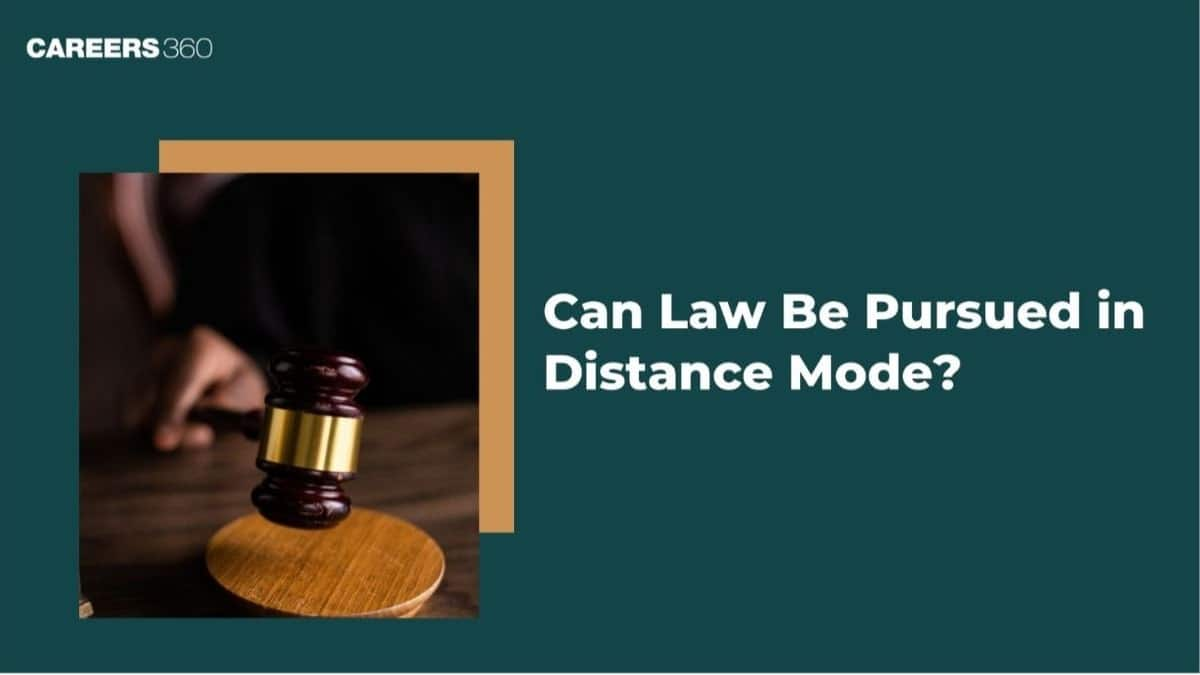Great Lakes Institute of Management PGPM Admissions 2026
Last Date to Apply: 10th Feb | Globally Recognized by AACSB (US) & AMBA (UK) | 17.8 LPA Avg. CTC for PGPM 2025
Law is one of the most respected professions and sought-after fields in the world. After graduating with a law degree from a recognised university, students can opt for various careers such as a lawyer, legal advisor, or judge. However, due to its high demand, many students may wonder whether it is possible to pursue a law degree through distance or correspondence mode. While distance learning is gaining popularity in recent times, students must understand a few things about pursuing law through distance mode.

Various law courses are offered in India, however not all the courses are recognised by the BCI as being equivalent to a law degree. Some of the courses offered in law are mentioned below.
UG Courses in Law
Last Date to Apply: 10th Feb | Globally Recognized by AACSB (US) & AMBA (UK) | 17.8 LPA Avg. CTC for PGPM 2025
Among top 100 Universities Globally in the Times Higher Education (THE) Interdisciplinary Science Rankings 2026
PG Courses in Law
According to the circular released by BCI, it does not recognise MA Law as equivalent to a LLM (Legum Magister). LLM degree is specifically created for law students, while an MA consists of broader academic subjects and is considered separate from an LLM degree.
For admissions, students need to appear for relevant entrance examinations. CLAT, SLAT, and AILET are the popular entrance examinations. Many universities also conduct university-level entrance examinations. In the table below, we have provided the exam details.
| Exam Name | Conducting Body | Exam Schedule |
|---|---|---|
Consortium of NLUs | ||
National Law University, Delhi | ||
Symbiosis Law Admission Test | ||
Directorate of Higher Education Mumbai |
Law as a career is regulated by the Bar Council of India (BCI). It governs legal education and law practice. According to BCI, it does not recognise any law degree pursued through online, distance, correspondence, open or distance mode. It mandates that law education should include classroom lectures, moot court and practice.
While distance or correspondence mode may sound intriguing to law aspirants, legal education requires practical training and moot court practice. All these requirements cannot be met successfully through distance mode. To practise law in India, students need to pass the All India Bar Examination (AIBE).
To conclude, legal education cannot be attained through open and distance learning (ODL mode). To pursue a Law degree, students must have an LLB or LLM degree from a recognised institute in India and successfully clear the All India Bar Examination (AIBE) examination.
On Question asked by student community
The Patna Law College entrance exam will comprise of Multiple-choice questions that will test the legal reasoning and analytical skills of the candidates. Candidates can expect direct questions from current affairs, verbal ability, logical reasoning etc.
The MH CET 5-year LLB syllabus comprises five subjects. The MH CET 5-year LLB subjects are Legal Aptitude and Legal Reasoning, General Knowledge with Current Affairs, Logical and Analytical Reasoning, English, and Basic Mathematics. The Legal Aptitude and Legal Reasoning, and Logical and Analytical Reasoning sections will each comprise 32
Hello,
PG Law (LLM) one-year course 2026 is for students who have completed their LLB degree and want to study law in more depth. This course helps you gain advanced knowledge in a specific area of law like corporate law, criminal law, constitutional law, or international law. Admission is usually
Hello
With a CLAT 2026 score of 60.75, AIR 17,715, and OBC-NCL rank 3,347 as an out-of-Delhi candidate, getting a seat in the Faculty of Law, Delhi University is very unlikely. DU’s cut-offs for OBC candidates are usually much higher, even in later rounds. You should keep backup options like
Hii
Karnavati University (Unitedworld School of Law) is considered a decent private option for law with good infrastructure, an active campus environment, moot courts, and internship exposure, but its placements are average and not guaranteed, so students need to be proactive in building their profiles through internships, moots, and networking;
Among top 100 Universities Globally in the Times Higher Education (THE) Interdisciplinary Science Rankings 2026
NAAC A+ Accredited | Among top 2% Universities Globally (QS World University Rankings 2026)
Among top 100 Universities Globally in the Times Higher Education (THE) Interdisciplinary Science Rankings 2026
Among top 100 Universities Globally in the Times Higher Education (THE) Interdisciplinary Science Rankings 2026
Ranked among top 10 B-Schools in India by multiple publications | Top Recruiters-Google, MicKinsey, Amazon, BCG & many more.
Highest CTC 30 LPA | #9 in Management Category by Times B-School | Merit-Based Scholarship Upto - 50 Crores